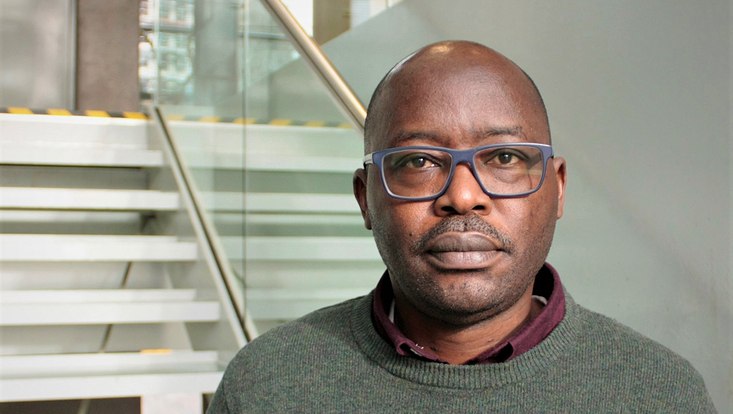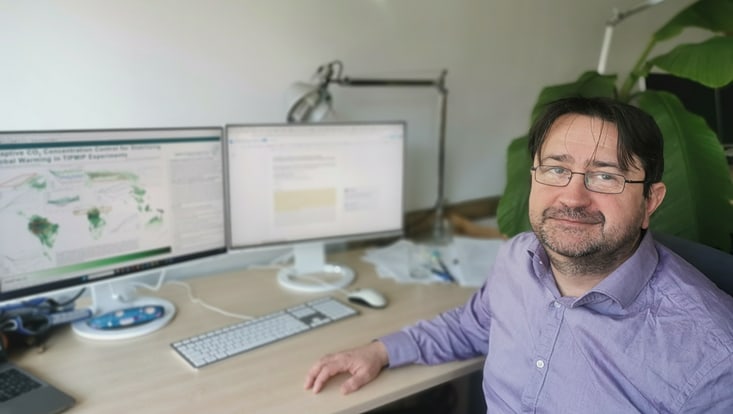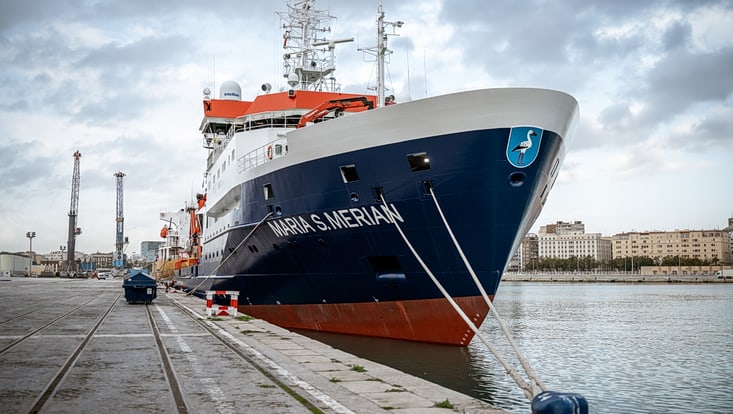Humboldt Fellow at the CEN“My work will help depict climate change more precisely”
27 March 2023, by Niklas Keller

Photo: UHH/CEN/Keller
Since this March, meteorologist Dr. Kaah Menang has been a Humboldt Fellow at the CEN. The research scholarship, awarded by the Humboldt Foundation, supports international postdocs and experienced researchers who plan to conduct research in Germany. In the following interview, Menang explains what he’s working on here and what made him choose Universität Hamburg.
What was your previous research focus?
I began my academic career by studying physics – in my home country of Cameroon and in Norway. Then I decided to do a doctorate in meteorology in England: at the University of Reading, a few kilometers west of London. Lastly, I conducted research on atmospheric radiation and climate extremes at the National Institute of Meteorology in Cameroon.
Since then, I’ve done a great deal of work on modelling approaches to better represent atmospheric radiation in climate models. My research interests also include climate change in Central Africa and climate extremes. Until last August, I was a visiting researcher at the European Centre for Medium-Range Forecasts (ECMWF) in Reading. When I’m not in Hamburg, I teach at the University of Buea in Cameroon.
What research projects will you work on here in Hamburg?
I’m especially focusing on processes involving water vapor – a natural greenhouse gas that warms the atmosphere. Absorption through water vapor is often imprecisely reflected in climate models, since we still don’t fully understand all aspects of the processes involved. During my Humboldt fellowship, I will assess the functionality of these models. Doing so will help to more accurately reflect climate change and greenhouse-gas processes in climate models.
What makes this research so important?
My research will help us to understand our planet’s climate sensitivity: how sensitive the climate is to rises in the atmospheric CO2 concentration. In this regard, not just the amount of CO2, but also a range of feedback effects are important. For example, from water vapor. Warmer air can hold more water vapor. Through cloud formation, the vapor can have either an additional warming effect, or a cooling effect on Earth. Understanding this is likely one of the most important challenges in today’s climate research.
How is the Humboldt fellowship helping you?
The fellowship gives me the financial backing I need for my research at Universität Hamburg. It also gives me the opportunity to work with some great researchers in Hamburg – like my mentor, Prof. Dr. Stefan Bühler. His expertise in climate and weather research is what made me choose Universität Hamburg.
I hope that the fellowship will also give me the chance to work on other research topics and develop new scientific approaches. I’m also interested in several projects at the Cluster of Excellence “Climate, Climatic Change, and Society” (CLICCS).
How long will the fellowship support your work at Universität Hamburg?
The Humboldt fellowship at Universität Hamburg covers a total of 18 months, divided into three stays in Hamburg of six months each. The fellowship ends in the fall of 2025.
The Humboldt Fellowship
Awarded by the Humboldt Foundation, the Humboldt Research Fellowship supports outstanding postdocs and experienced researchers who wish to conduct research in Germany.
Every Humboldt fellow is supported by an academic host. Meteorologist Prof. Dr. Stefan Bühler is Dr. Kaah Menang’s host. Bühler is Director of Universität Hamburg’s Meteorological Institute, a member of CEN and researcher at the Cluster of Excellence CLICCS.


